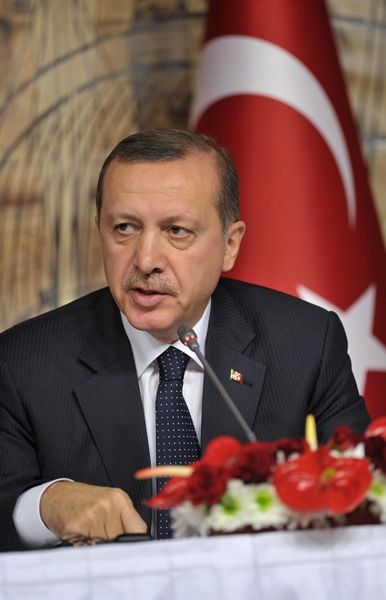Turkey’s Prime Minister Recep Tayyip Erdoğan strives for a leading role in the region. But is Ankara up to the job? Other candidates like Egypt and Iran also line up for the top position. And Turkey knows, that it has to speak to Israel
Successful politicians often retain a dash of unpredictability. They have the ability to surprise or seize the moment. Recep Tayyip Erdoğan’s moment of surprise can be watched on YouTube. It came during a panel discussion at the World Economic Forum in Davos in January 2009. The topic was the Middle East and Gaza and the Turkish prime minister was seated next to Israel’s President Shimon Peres. When Peres finished speaking the moderator moved to end the discussion, interrupting Erdoğan’s response to Peres. The Turkish Prime Minister angrily shuffled his papers, stood up and left the stage.
Erdoğan came home to a hero’s welcome. He had played perfectly to Turkish sentiments, where many perceive their country as a great nation too often ignored and belittled in the ‘West’. With Erdoğan, they believe they have found a strong leader who will not be pushed around.
The good Muslim
The West views the Istanbul-born leader of the AKP as a conservative Muslim who nevertheless respects democracy, fosters market liberalism and maintains good relationships with Europe and the United States.
But the Davos moment can be seen as a symbol of Turkey’s shifting geopolitical strategy. Some experts believe this self-confident Turkish government has aspirations to establish a neo-Ottoman Empire. The time seems to be right for such moves.
Ever since the rebellion in Tunisia which led to the ousting of President Ben Ali, the region has been in turmoil. Disenchanted youth and high-unemployment is bringing people onto the streets to demand more democracy and a fairer distribution of wealth. These revolutions have run very different courses.
In Libya, the regime of Moammar Gadhafi was overthrown and Gadhafi killed, the country however has found little respite. Turkey’s neighbor Syria is being torn apart by internecine warfare. And Egypt is still searching for the right path after the triumph of the Muslim Brotherhood in recent elections.
All eyes on Turkey
With so much unrest in the region, eyes are beginning to turn to Turkey. It might just be the ideal role model for the region, a prosperous Muslim nation with secular structures, coveting the respect of bigger players in the northern part of the hemisphere.
Erdoğan, State President Abdullah Gül, and Foreign Minister Ahmet Davutoglu are doing their best to present Turkey as the new regional scoutmaster. Take Egypt, where Erdoğan was enthusiastically cheered by Egyptions when he visited Cairo in September 2011. He also received a pop star reception from crowds in Tunis and Tripoli.
To be sure, the economy has done extremely well in recent years. In 2011 growth was at 9.6%. But 2012 saw this growth slow as the recession in Europe trundles on, almost half of Turkish goods are shipped to Europe. To keep its engine turning, Ankara is moving to intensify business with Arab and Middle East countries.
Domestic problems
Skeptics of Turkey’s role model status point to lingering domestic problems. Secular Kemalists are deeply suspicious of the Sunni Muslim Prime Minister. Political pundits point to the tension with the large Kurdish minority and human rights activists warn that freedom of the press is under threat.
Middle East expert Udo Steinbach believes that Erdoğan and his advisers have actually been sobered by these issues and have scaled down their grand ambitions a bit. “There are other candidates lining up for the top position, notably Egypt and Iran,” explains Steinbach to JVG, who also warns that the situation in Syria might have a destabilizing impact on Turkey.
Stand-off with Israel
And then there is Israel. Erdoğan was wildly applauded when he demanded an apology from Israel in 2010 after Israeli commandos intercepted the Gaza bound Mavi Marmara in the Mediterranean Sea, killing nine Turkish activists. Israel offered no apology and diplomatic relations between the countries froze overnight. During Israel’s recently military offensive against the rocket-firing Hamas, Erdoğan accused Israel, and not Hamas, of terrorist acts.
Once again Erdoğan shrewdly played the anti-Israel card. But Erdoğan is a pragmatist and knows that his quest for a leading role in the Middle East will get him nowhere as long as he does not talk to Israel. At the moment, Turkey and Israel are quietly working toward a face-saving resolution to this stand-off.
According to reports, Erdoğan will step down as Prime Minister in 2014. Experts predict that he will then run for State President. His chances are good given his political clout. Whatever happens, he will continue his quest for a key role in the Middle East, flavored with neo-Ottoman notions, and salted with a big portion of realism.
After all, he is a man who knows how to seize the right moment.

